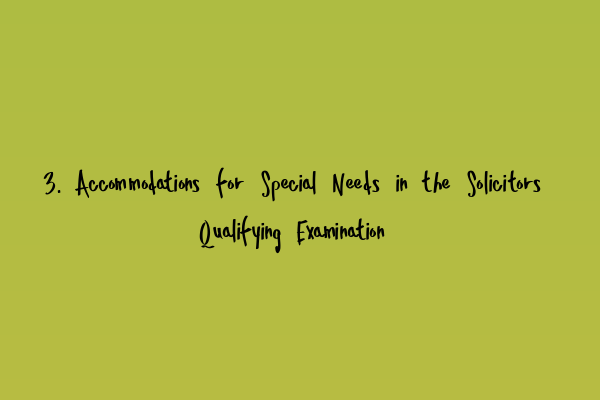Accommodations for Special Needs in the Solicitors Qualifying Examination
As aspiring solicitors, we understand the challenges and pressures that come with studying for the Solicitors Qualifying Examination (SQE). The SQE is a rigorous assessment that tests your knowledge, skills, and competencies to ensure that you are prepared for a successful career in law. However, it is important to recognize that some individuals may require accommodations to level the playing field and allow them to demonstrate their abilities to the best of their potential.
In this article, we will discuss the accommodations available to candidates with special needs in the SQE and how they can access these accommodations. We believe that everyone should have equal opportunities to excel in their legal careers, and these accommodations ensure that candidates with disabilities or special needs are not disadvantaged in any way.
The Importance of Accommodations
Accommodations in the SQE are designed to provide candidates with disabilities or special needs the necessary support to demonstrate their knowledge and skills. These accommodations aim to eliminate barriers and create a level playing field for all candidates, enabling them to showcase their abilities without hinderance.
By providing accommodations, the Solicitors Regulation Authority (SRA) ensures that the SQE is fair and accessible to all prospective solicitors. It allows candidates with special needs to fully engage with the examination process and have an equal opportunity to succeed.
Types of Accommodations
The SRA recognizes that individuals may require different accommodations based on their unique circumstances. Some common accommodations that are available in the SQE include:
- Extra time: Candidates with certain disabilities, such as dyslexia or physical impairments, may require additional time to complete the examination. Extra time provisions ensure that candidates have ample opportunity to answer all questions and complete the examination without feeling rushed or disadvantaged.
- Use of assistive technology: Some candidates may require assistive technology, such as screen readers or speech recognition software, to access examination materials or communicate their answers effectively. The SRA recognizes the importance of technology in accommodating the needs of candidates and allows appropriate assistive technology to be used during the examination.
- Accessible examination formats: The SRA provides alternative examination formats, such as Braille or large print, for candidates with visual impairments. These formats ensure that candidates can access examination materials in a way that is suitable for their needs.
- Alternative venue arrangements: Candidates with mobility challenges may require accommodations related to the examination venue, such as wheelchair access or seating arrangements. The SRA works closely with examination centers to ensure that suitable arrangements are made to accommodate these needs.
It is important to note that accommodations are tailored to the individual’s specific needs, with the aim of providing a fair and accessible examination experience. The SRA takes confidentiality seriously and ensures that any accommodations granted are kept confidential to protect the candidate’s privacy.
Requesting Accommodations
If you believe that you require accommodations for the SQE due to a disability or special need, it is essential to make a formal request to the SRA. The SRA has a dedicated process for requesting accommodations, and it is recommended to start the process as early as possible to allow sufficient time for review and arrangements.
To request accommodations, you will typically need to provide supporting documentation, such as medical or educational reports, that clearly outline your specific needs and the recommended accommodations. The SRA will review your request and supporting documents to assess whether the accommodations are necessary and appropriate.
It is crucial to provide comprehensive and up-to-date information to support your request, as this will help the SRA make an informed decision. If necessary, you may also be asked to attend an assessment with an independent expert to provide further insight into your needs.
Once your request for accommodations has been reviewed and approved, the SRA will work closely with you to implement the necessary arrangements. It is important to keep communication open with the SRA throughout the process and notify them of any changes or updates regarding your accommodations.
Final Thoughts
The SQE aims to provide a fair and equal opportunity for all aspiring solicitors. Accommodations for special needs play a crucial role in ensuring that candidates with disabilities or unique needs are not disadvantaged during the examination process. By providing appropriate accommodations, the SRA promotes inclusivity and diversity within the legal profession.
If you believe that you require accommodations for the SQE, we encourage you to review the information provided on the SRA’s website and initiate the request process. Remember, accommodations are designed to level the playing field and allow you to demonstrate your abilities to their fullest extent.
Related Articles:
